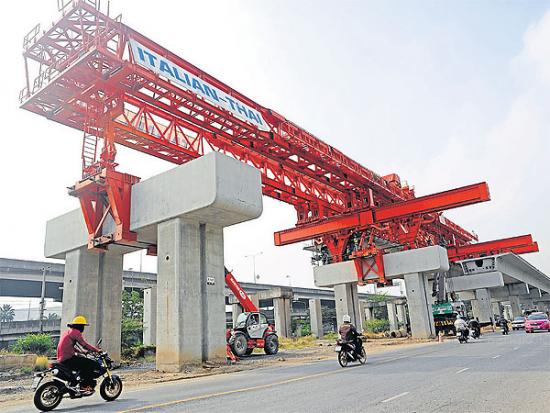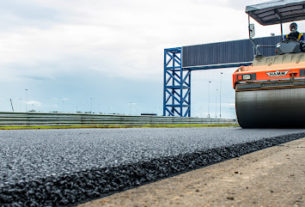
Motorists drive past construction of the 26.8-kilometre Bang Sue-Rangsit Red Line mass-transit route. The government yesterday agreed to borrow again from the Japan International Cooperation Agency to continue funding the project. WICHAN CHAROENKIARTPAKUN
The cabinet gave the nod yesterday to a State Railway of Thailand (SRT) proposal to borrow ¥38.2 billion (10.4 billion baht) from the Japan International Cooperation Agency (JICA) to finance the second stage of the Red Line electric rail route linking Bangkok and Pathum Thani.
Deputy government spokesman Sansern Kaewkamnerd said the JICA was the main lender for the first stage of the Red Line (Bang Sue-Rangsit), extending ¥63 million in loans to Thailand in 2009. The lending contract for the first section of the Red Line construction is due to expire this month.
Mr Sansern said the 20-year lending contract for the second section will carry annual interest of 0.4%, with a six-year grace period.
The entire Red Line project requires a combined investment cost of 42.8 billion baht, of which 32.8 billion will be sponsored by foreign loans, mainly from the JICA, and 10 billion from domestic borrowing.
In a related development, the cabinet yesterday acknowledged a fourth meeting between China and Thailand for the development of a 1.435-metre standard-gauge rail line between Bangkok and Nong Khai.
Deputy Prime Minister MR Pridiyathorn Devakula commented in a report submitted to the cabinet that Thailand would borrow from the Export-Import Bank of China only to finance the rail and civil works.
Thai and Chinese authorities recently agreed on a 60-40 shareholding plan in their first joint venture to oversee management of the double-track rail routes to facilitate travel between Bangkok and southern China. The SRT will hold a 30% stake, Thai private companies experienced in rail management 30% and a Chinese rail developer the rest.
The scope of the joint development covers 867 kilometres of double-track rail routes — Bangkok-Kaeng Khoi; Map Ta Phut-Kaeng Khoi; and Nakhon Ratchasima-Nong Khai, across the river from the Laotian capital.
The cabinet also approved a measure to stimulate tourism, requiring all state agencies, state-owned enterprises and local administrations to organise seminars at domestic hotels. It approved a 50% cut in the hotel room surcharge to 40 baht per room per year to ease the financial burden of hotels affected by the 300-baht daily minimum wage.
Source: http://www.bangkokpost.com/news/general/587729/japanese-agency-to-finance-red-line-construction


